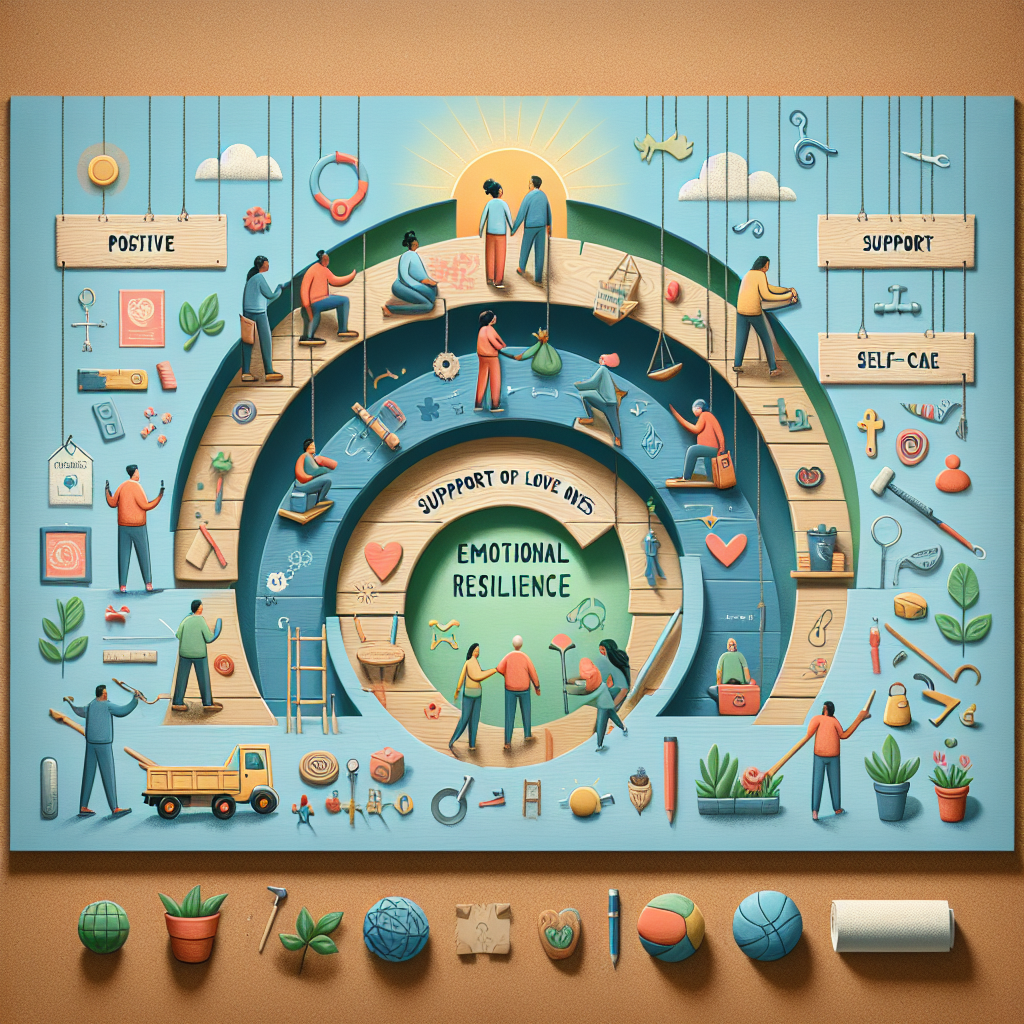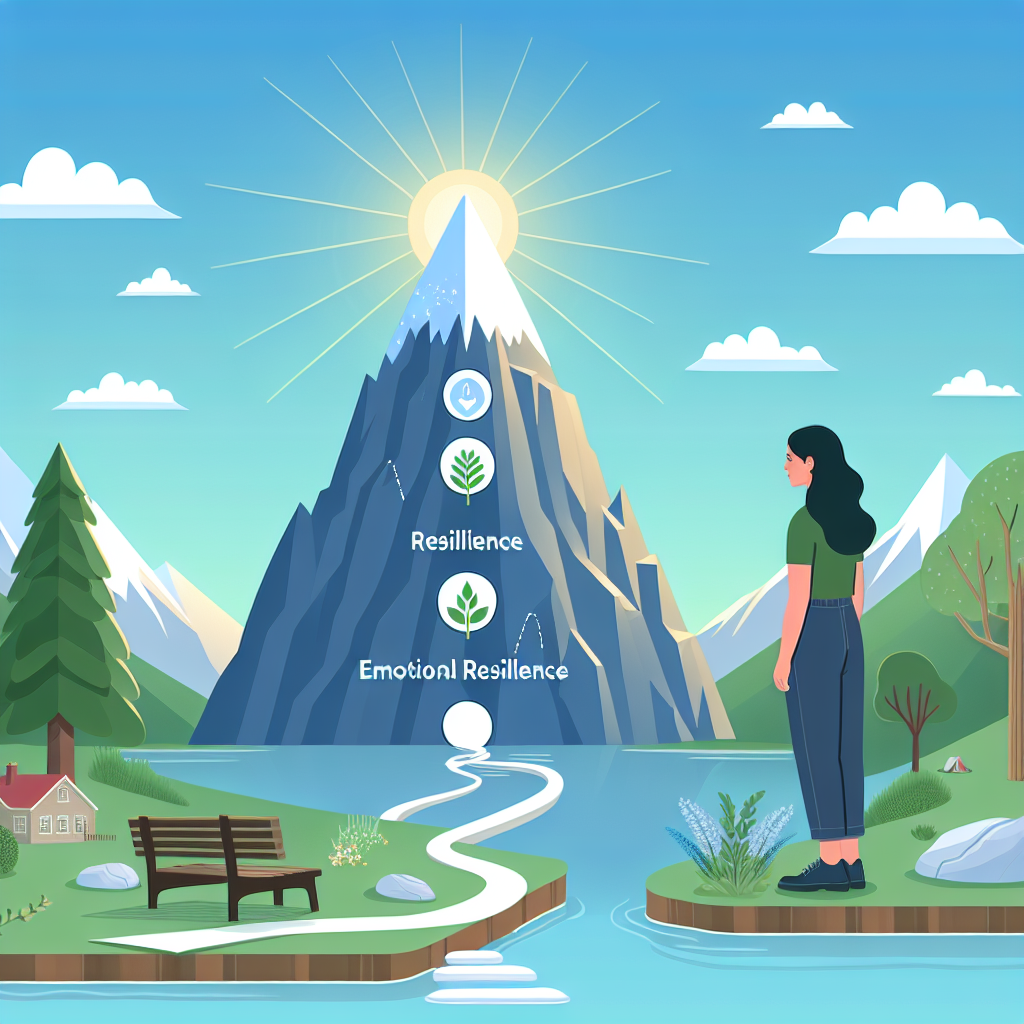How to Build Emotional Resilience for Better Mental Health

Start building your emotional resilience today for better mental health. Learn more about the strategies and techniques that can help you cope with life’s challenges more effectively. Visit My Vibrant Vitality now.
Strategies for Building Emotional Resilience to Improve Mental Health
Emotional resilience is the ability to adapt to stressful situations or crises. It’s the mental fortitude that allows us to bounce back from adversity, trauma, tragedy, threats, or significant sources of stress. Building emotional resilience not only helps you get through difficult circumstances, it also empowers you to grow and even improve your life along the way. It’s the mental reservoir of strength that we’re able to call on in times of need to carry us through without falling apart. Psychologists believe that this resilience is a learned ability and that it can be developed by anyone.
The first strategy to build emotional resilience is to establish and maintain good relationships with close family members, friends, and others. Supportive, loving relationships are the foundation of emotional health. They can provide you with the reassurance and guidance you need to navigate through life’s challenges. It’s important to accept help and support from those who care about you and will listen to you. In fact, most people who have survived major life crises report that they were able to do so because of the support they received from others.
Another key strategy is to take care of your body. Physical health plays a significant role in our emotional resilience. Regular exercise, a healthy diet, adequate sleep, and avoiding harmful substances can help you manage stress levels and maintain a positive outlook. Exercise, in particular, has been found to reduce feelings of anxiety and improve mood, making it a powerful tool in building emotional resilience.
Developing a positive outlook is another crucial step in building emotional resilience. This involves practicing optimism and maintaining a hopeful outlook. It’s about learning to view adversity as a challenge rather than a paralyzing event. It’s not about denying the reality of your situation; it’s about interpreting how you respond to the situation. Are you catastrophizing, or are you taking a balanced and realistic approach?
Moreover, learning to accept that change is a part of life is another strategy for building emotional resilience. Certain goals may no longer be attainable as a result of adverse situations. Accepting circumstances that cannot be changed can help you focus on circumstances that you can alter.
Additionally, setting realistic goals and moving towards them one step at a time can build your resilience. Do something regularly — even if it seems like a small accomplishment — that enables you to move toward your goals. Instead of focusing on tasks that seem unachievable, ask yourself, “What’s one thing I know I can accomplish today that helps me move in the direction I want to go?”
Lastly, taking decisive actions is a vital part of building emotional resilience. Act on adverse situations as much as you can. Take decisive actions, rather than detaching completely from problems and stresses and wishing they would just go away.
In conclusion, building emotional resilience takes time and intentionality. It involves establishing supportive relationships, taking care of your physical health, developing a positive outlook, accepting change, setting realistic goals, and taking decisive actions. With these strategies, you can equip yourself with the tools to navigate life’s ups and downs in a healthy way, thereby improving your overall mental health. Remember, it’s not about avoiding stress but learning how to thrive within it.
The Role of Emotional Resilience in Enhancing Mental Well-being

Emotional resilience is a critical aspect of mental health that often goes unnoticed. It is the ability to adapt to stressful situations or crises, and it plays a pivotal role in enhancing mental well-being. Emotional resilience is not about avoiding stress or hardship, but rather about learning how to cope with it effectively. It is about developing the capacity to bounce back from adversity, to maintain balance in your life despite disruptive events or conditions.
Emotional resilience is not an innate trait that only a few lucky ones are born with. It can be developed and strengthened over time. Building emotional resilience involves a combination of factors, including self-awareness, self-care, positive relationships, and life skills.
Self-awareness is the first step towards building emotional resilience. It involves understanding your emotions, recognizing what triggers them, and knowing how you react to those triggers. This awareness allows you to manage your emotional responses better and prevent them from spiraling out of control.
Self-care is another crucial aspect of emotional resilience. It involves taking care of your physical, emotional, and mental health. Regular exercise, a balanced diet, adequate sleep, and relaxation techniques such as meditation or yoga can significantly improve your ability to cope with stress.
Positive relationships also play a vital role in building emotional resilience. Having a strong support network can provide you with the emotional support and encouragement you need during tough times. It’s essential to surround yourself with positive, supportive people who can help you navigate through life’s challenges.
Life skills such as problem-solving, communication, and decision-making are also crucial for building emotional resilience. These skills can help you navigate through difficult situations and make sound decisions under pressure.
Building emotional resilience is a continuous process that requires time and effort. It’s not about being unaffected by life’s challenges, but rather about learning how to deal with them effectively. It’s about developing the ability to bounce back from adversity and maintain balance in your life despite disruptive events or conditions.
Emotional resilience can significantly enhance your mental well-being. It can help you manage stress, reduce anxiety, and improve your mood. It can also boost your self-esteem and confidence, making you feel more in control of your life.
Moreover, emotional resilience can also improve your physical health. Research has shown that high levels of stress can lead to various health problems, including heart disease, high blood pressure, and diabetes. By helping you manage stress effectively, emotional resilience can help protect your physical health as well.
In conclusion, emotional resilience is a critical aspect of mental health that can significantly enhance your overall well-being. It involves a combination of self-awareness, self-care, positive relationships, and life skills. Building emotional resilience is a continuous process that requires time and effort, but the benefits are well worth it. So, start working on building your emotional resilience today, and you’ll be better equipped to handle whatever life throws your way.
Steps to Cultivate Emotional Resilience for Optimal Mental Health
Emotional resilience is a crucial aspect of mental health that often goes unnoticed. It refers to our ability to adapt to stressful situations or crises. More resilient individuals can ‘roll with the punches,’ bouncing back from adversity and achieving positive mental health outcomes. Cultivating emotional resilience is not an overnight process; it requires time, patience, and consistent effort. However, the rewards are well worth the investment.
The first step in building emotional resilience is self-awareness. This involves understanding your emotions, recognizing what triggers them, and how they affect your thoughts and actions. Self-awareness is the foundation of emotional resilience because it allows you to identify and address your emotional vulnerabilities and strengths.
Next, it’s essential to practice emotional regulation. This means learning to manage strong emotions so they don’t overwhelm you. Techniques such as deep breathing, meditation, and mindfulness can help you stay calm and focused in stressful situations. Emotional regulation also involves expressing your feelings in a healthy, constructive way, rather than bottling them up or lashing out.
Another key aspect of emotional resilience is maintaining a positive outlook. This doesn’t mean ignoring the negative aspects of life, but rather choosing to focus on the positive ones. Optimism can help you see challenges as opportunities for growth, rather than threats. It can also boost your confidence and motivation to overcome obstacles.
Building strong, supportive relationships is also crucial for emotional resilience. Social support can provide a buffer against stress and adversity. It can also provide a sense of belonging and acceptance, which can boost your self-esteem and overall well-being. Therefore, it’s important to cultivate relationships with people who are supportive, understanding, and positive.
Self-care is another important step in building emotional resilience. This involves taking care of your physical health through regular exercise, a balanced diet, and adequate sleep. It also involves taking time to relax and do things you enjoy. Self-care can help reduce stress and improve your mood, making it easier to cope with adversity.
Finally, it’s important to seek professional help if you’re struggling to build emotional resilience on your own. Mental health professionals can provide guidance and support, and can teach you strategies to manage stress and improve your emotional resilience.
In conclusion, building emotional resilience is a multi-faceted process that involves self-awareness, emotional regulation, a positive outlook, strong relationships, self-care, and professional help if needed. By cultivating these skills and habits, you can enhance your ability to cope with stress and adversity, leading to better mental health. Remember, it’s okay to ask for help and take care of your mental health. After all, our mental health is just as important as our physical health.